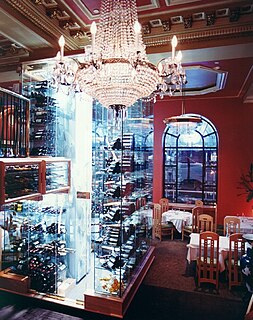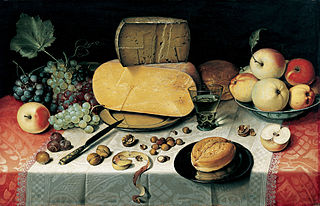Related Research Articles

A party is a gathering of people who have been invited by a host for the purposes of socializing, conversation, recreation, or as part of a festival or other commemoration of a special occasion. A party will typically feature food and beverages, and often music and dancing or other forms of entertainment. In many Western countries, parties for teens and adults are associated with drinking alcohol such as beer, wine, or distilled spirits.

A restaurant, or an eatery, is a business that prepares and serves food and drinks to customers. Meals are generally served and eaten on the premises, but many restaurants also offer take-out and food delivery services. Restaurants vary greatly in appearance and offerings, including a wide variety of cuisines and service models ranging from inexpensive fast food restaurants and cafeterias, to mid-priced family restaurants, to high-priced luxury establishments.

Brunch is a combination of breakfast and lunch, and regularly has some form of alcoholic drink served with it. It is usually served anytime before 3 o'clock in the afternoon. The word is a portmanteau of breakfast and lunch. Brunch originated in England in the late 19th century and became popular in the United States in the 1930s.

An hors d'oeuvre, appetizer or starter is a small dish served before a meal in European cuisine. Some hors d'oeuvres are served cold, others hot. Hors d'oeuvres may be served at the dinner table as a part of the meal, or they may be served before seating, such as at a reception or cocktail party. Formerly, hors d'oeuvres were also served between courses.

A bar is a retail business establishment that serves alcoholic beverages, such as beer, wine, liquor, cocktails, and other beverages such as mineral water and soft drinks. Bars often also sell snack foods such as potato chips or peanuts, for consumption on their premises. Some types of bars, such as pubs, may also serve food from a restaurant menu. The term "bar" also refers to the countertop and area where drinks are served. The term "bar" derives from the metal or wooden bar (barrier) that is often located along the length of the "bar".

A crêpe or crepe is a type of very thin pancake. Crêpes are usually of two types: sweet crêpes and savoury galettes. Crêpes are served with a variety of fillings, from the simplest with only sugar to flambéed crêpes Suzette or elaborate savoury galettes. While crêpes are often associated with Brittany, a region in the northwest of France, their consumption is widespread in France, Belgium, the Netherlands, Canada, and many parts of Europe, North Africa, Lebanon, Brazil and Argentina.

A dining car or a restaurant car, also a diner, is a railroad passenger car that serves meals in the manner of a full-service, sit-down restaurant.

A buffet is a system of serving meals in which food is placed in a public area where the diners serve themselves. A form of service à la française, buffets are offered at various places including hotels, restaurants, and many social events. Buffet restaurants normally offer all-you-can-eat food for a set price, but some measure prices by weight or by number of dishes. Buffets usually have some hot dishes, so the term cold buffet has been developed to describe formats lacking hot food. Hot or cold buffets usually involve dishware and utensils, but a finger buffet is an array of foods that are designed to be small and easily consumed only by hand, such as cupcakes, slices of pizza, foods on cocktail sticks, etc.

Flambé is a cooking procedure in which alcohol is added to a hot pan to create a burst of flames. The word means "flamed" in French.

Red velvet cake is traditionally a red, red-brown, crimson or scarlet colored chocolate layer cake, layered with white cream cheese or ermine icing. Traditional recipes do not use food coloring, with the red color due to non-Dutched, anthocyanin-rich cocoa.

A financier is a small French almond cake, flavoured with beurre noisette, usually baked in a small mold. Light and moist with a crisp, eggshell-like exterior, the traditional financier also contains egg whites, flour, and powdered sugar. The molds are usually small rectangular loaves similar in size to petits fours.

A flaming drink is a cocktail or other mixed drink that contains flammable, high-proof alcohol, which is ignited prior to consumption. The alcohol may be an integral part of the drink, or it may be floated as a thin layer across the top of the drink. The flames are mostly for dramatic flair. However, in combination with certain ingredients, the flavor of the drink is altered. Some flavors are enhanced, and it may impart a toasted flavor to some drinks.

Cocktail garnishes are decorative ornaments that add character or style to a mixed drink, most notably to cocktails.
There are many and varied customs associated with the celebration of birthdays around the world.

A drinking establishment is a business whose primary function is the serving of alcoholic beverages for consumption on the premises. Some establishments may also serve food, or have entertainment, but their main purpose is to serve alcoholic beverages. There are different types of drinking establishment ranging from seedy bars or nightclubs, sometimes termed "dive bars", to 5,000 seat beer halls and elegant places of entertainment for the elite. A public house, informally known as a "pub", is an establishment licensed to serve alcoholic drinks for consumption on the premises in countries and regions of British influence. Although the terms are increasingly used to refer to the same thing, there is a difference between pubs, bars, inns, taverns and lounges where alcohol is served commercially. A tavern or pot-house is, loosely, a place of business where people gather to drink alcoholic beverages and, more than likely, also be served food, though not licensed to put up guests. The word derives from the Latin taberna and the Greek ταβέρνα/taverna.
The Magic Pan is a small American chain of fast-food and take-away creperies using the recipes of a now-closed chain of full-service restaurants that specialized in crêpes, popular in the early 1970s through early 1990s, which peaked at 110 Magic Pan locations throughout the United States and Canada.

Timballo is an Italian baked dish consisting of pasta, rice, or potatoes, with one or more other ingredients included. Variations include the timballo Alberoni, combining macaroni, shrimp sauce, mushrooms, butter and cheese, and named for Giulio Alberoni, and the Timballo Pattadese.

A BLT cocktail is a cocktail made out of the contents of a BLT sandwich,, blended together with vodka. Variants on the drink include utilizing bacon vodka instead of traditional vodka, substituting liquor for lettuce, incorporating bacon salt, or including cucumber flavored vodka.

A Signature drink is any unique or original drink that expresses the nature of the person or establishment creating it.

Mon Ami Gabi is a chain of French bistros in the United States operated by Lettuce Entertain You Enterprises. Mon Ami Gabi has five locations, with the original being in Chicago, Illinois.
References
- ↑ Barbara Kirshenblatt-Gimblett (2012). "Making Sens of Food in performance: The Table and the Stage". In Banes, Sally; Lepecki, Andre (eds.). The Senses in Performance. New York and Oxford: Routledge. pp. 77–78. ISBN 978-1-134-46070-0.
- ↑ Wilson, Dede (2008). The Birthday Cake Book: 75 Recipes for Candle-Worthy Creations . Boston, MA: Harvard Common Press. pp. 18. ISBN 978-1-55832-382-7.
birthday candles.
- ↑ Stradley, Linda (17 May 2015). "Crepes Suzette History and Recipe". What's Cooking America. Retrieved 20 February 2020.
- ↑ Gisslen, Wayne (2009) [2005]. Professional Baking (Fifth ed.). Hoboken, NJ: John Wiley & Sons. p. 253. ISBN 978-0-471-78349-7.
- ↑ Devantier, Alecia T.; Turkington, Carol A. (2006). Extraordinary Jobs in the Food Industry. New York: Infobase Publishing. pp. 50–53. ISBN 978-1-4381-1173-5.
- ↑ Miron, Amanda; Brown, Douglas Robert (2006). The Professional Bar & Beverage Manager's Handbook: How to Open and Operate a Financially Successful Bar, Tavern, and Nightclub. Ocala, FL: Atlantic Publishing Company. pp. 218–220. ISBN 978-0-910627-59-7.
| This food-related article is a stub. You can help Wikipedia by expanding it. |